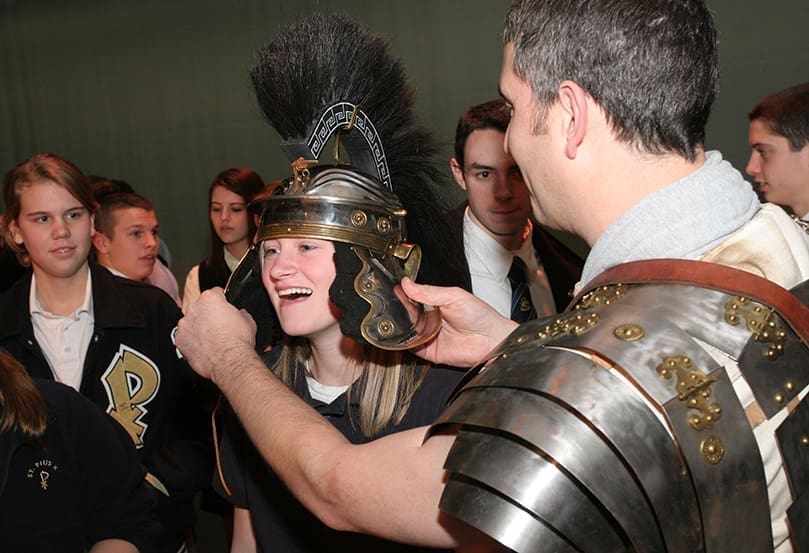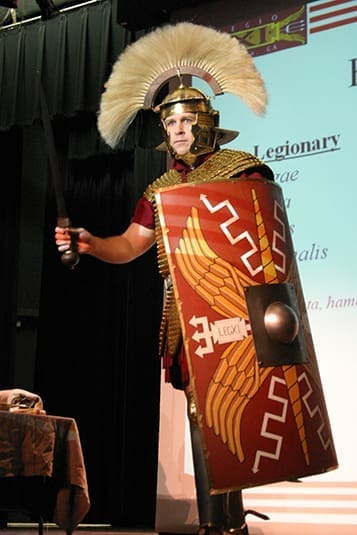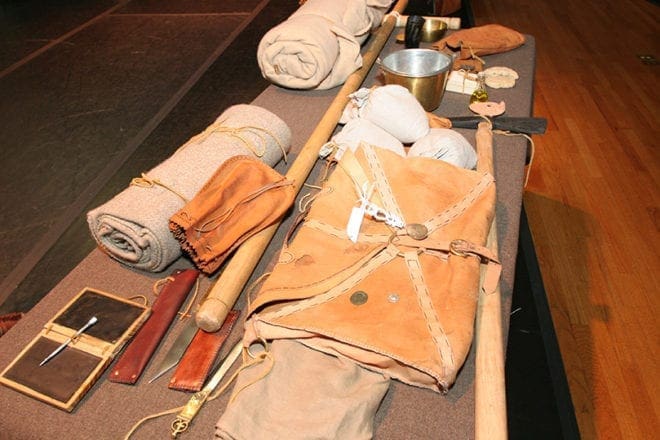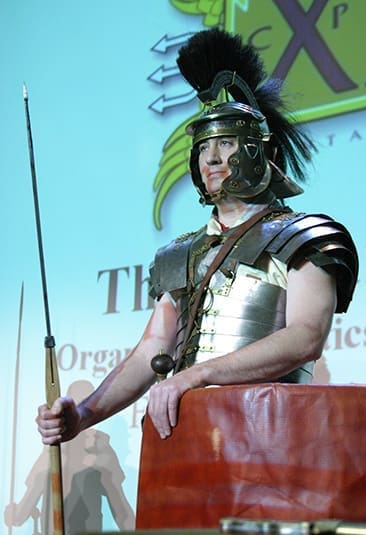 Photo By Michael Alexander
Photo By Michael AlexanderAtlanta
Roman Army Reenactment Enlivens Ancient History
By STEPHEN O’KANE, Staff Writer | Published January 31, 2008
Students studying Latin at St. Pius X High School received a living history lesson Jan. 11 from first-century Roman soldiers brought to life by Legio XI, a Georgia-based reenactment group.
Three soldiers, dressed as a centurion, a legionary and an auxiliary infantryman, took the stage in the Monsignor Terry W. Young Center to explain their armor, weapons and fighting philosophies to nearly 100 students. Two tables on either side of the stage held weapons, shields and travel gear—all items one would have found with a Roman soldier almost 2,000 years ago.

Edge Gibbons is dressed as a Roman centurion. In his right hand he holds a Roman sword known as a gladius and he holds a curved body shield in his left hand. His helmet contains a crest made of horse hair. Centurions were the equivalent of a captain or lieutenant colonel in today’s military. Gibbons is a colonel in the U.S. Army. Photo By Michael Alexander
Col. Edge Gibbons, who has served in the U.S. Army for more than 25 years, led the session, describing the items on stage and answering students’ questions, bringing their textbook lessons to life.
“I have always been fascinated by the Roman army, in particular, since I was your age,” said Gibbons, in response to a student’s question. “And then when I found out there was a reenactment group here in Atlanta, I joined up.”
The first topic of discussion addressed the differences between pre- and post-Marius Roman armies and helped set up the origins of the first century Roman army. Gibbons told the story of Marius, a general who reformed the Roman army, and how the Roman army evolved leading up to the first century.
“The Roman army was so incredibly advanced for its age that we probably didn’t see another army as professional until the 17th, 18th century,” said Gibbons.
Following the brief introduction, the group began to address more specific items, such as the organizational style of the army, its fighting equipment and fighting tactics. Gibbons explained the different duties of the legionaries and the auxiliary troops and, after the presentation, invited the students on stage to examine the gear more carefully.
Susan Belmonte, a Latin teacher and department chair of foreign languages at St. Pius, came across Legio XI when she took a group of students to the Georgia Junior Classical League Convention last year. After e-mailing Gibbons on and off, they finally found a time that the group could visit the school.

On a table for display is some of the 40 pounds of equipment Roman soldiers carried as they marched approximately 20 miles a day. The fighting armor worn by the soldiers averaged about 45 pounds. Photo By Michael Alexander
Legio XI recreates the equipment, technology and ethos of the first-century Roman army and teaches those interested about its history. The group conducts monthly workshops to exchange ideas and make equipment, while enjoying the company of friends with like interests.
“When we started the legion about eight years ago, there were several groups across North America, and we were looking for one that wasn’t already taken,” said Paul Montello, when asked how the group chose its name. “This one has a pretty neat history,” said Montello, a 1985 graduate of St. Pius.

Paul Montello, a 1985 graduate and a member of Legio XI, a Georgia Roman army re-enactment group, stands on the stage of the St. Pius X High School auditorium during a presentation for the Latin students. Holding a weapon called a pilum in his right hand and a curved body shield with a leather cover in his left hand, Montello is dressed like a Roman legionary soldier. Photo By Michael Alexander
Belmonte brought Legio XI to St. Pius X to breathe life into the lessons the students are studying.
“The textbook series that we use … is called the Cambridge series, and in the third unit the students start learning about life in Roman Britain,” said Belmonte. “A lot of the characters in the book are in the army, so there’s a focus on what it was like to be a solider, in particular in the first century A.D. around the time of Domitian. … So really what they (Legio XI) do directly relates to my curriculum. And then the students who are coming who aren’t studying that right now, but who are Latin students, eventually will study this, so they will be prepared.”
Both the students and the presenters enjoyed the event.
“I thought it was really interesting,” said Nicole Haswell, a sophomore. “There was a lot of great information that people don’t usually know about the Roman army. … It was interesting to find out about stuff we are learning about.”
“We really enjoy it,” said Gibbons. “The problem is that everything you see on TV or in a movie about the Roman army is wrong. … What I enjoy about it is actually showing them accurate equipment and giving them a better, more accurate appreciation of the tactics and techniques of the Roman army.”
For information, visit www.11thlegion.com or contact Edge Gibbons at edward.gibbons@us.army.mil or Chris Stewart at cacrispvs@gmail.com.